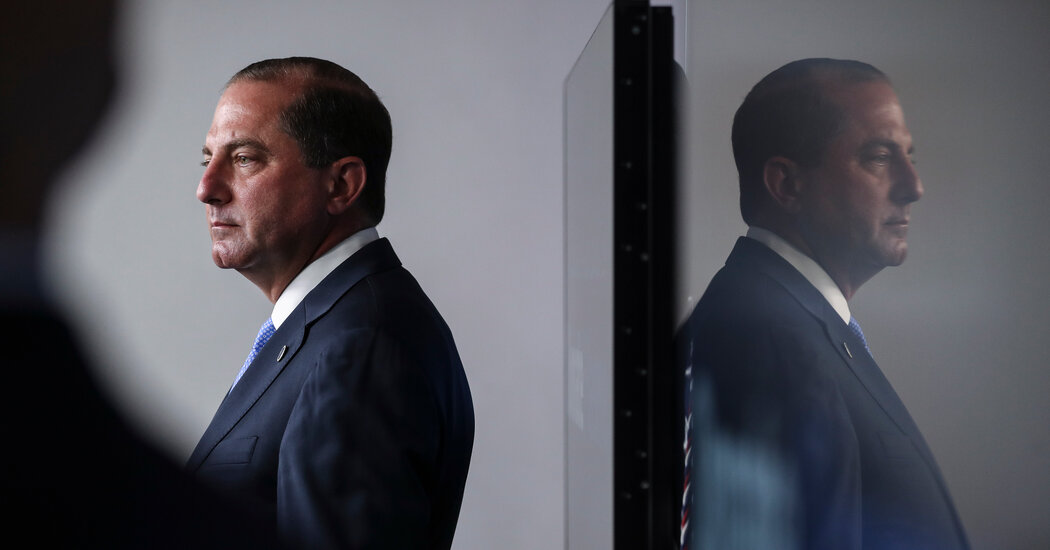
In a stunning declaration of authority, Alex M. Azar II, the secretary of health and human services, this week barred the nation’s health agencies, including the Food and Drug Administration, from signing any new rules regarding the nation’s foods, medicines, medical devices and other products, including vaccines.
Going forward, Mr. Azar wrote in a Sept. 15 memorandum obtained by The New York Times, such power “is reserved to the Secretary.” The bulletin was sent to heads of operating and staff divisions within H.H.S.
It’s unclear if or how the memo would change the vetting and approval process for coronavirus vaccines, three of which are in advanced clinical trials in the United States. Political appointees, under pressure from the president, have taken a string of steps over the past few months to interfere with the standard scientific and regulatory processes at the health agencies. For example, a much criticized guideline on testing for the coronavirus was not written by C.D.C. scientists, and was posted on the agency’s public website over their objections. It was reversed on Friday.
Outside observers were alarmed by the new memo and worried that it could contribute to a public perception of political meddling in science-based regulatory decisions. Dr. Mark McClellan, who formerly headed the F.D.A. and now runs Duke University’s health policy center, praised the agency’s work on vaccine development but said the policy change was ill-timed.
“We’re in the midst of a pandemic, when trust in the public health agency is needed more than ever,” he said. “So, I’m not sure what is to be gained with a management change with respect to F.D.A. when they are doing such critical work.”
- The C.D.C. reverses its guidance on testing for people who were exposed to the virus and aren’t showing symptoms.
- Emails by a former top Trump health official and his science adviser show efforts to silence the C.D.C.
- Trump acknowledged that distribution of an authorized vaccine for ‘every American’ may not be until next year.
Dr. Peter Lurie, president of the Center for Science in the Public Interest and a former associate commissioner of the F.D.A., called the new policy “a power grab.”
Many rules issued by federal health agencies are signed by lawyers or by the heads of agencies, including the F.D.A., under the umbrella of H.H.S. The new memo requires the secretary to sign them, which Dr. Lurie said could lead to delays in the regulatory process.
“It will introduce an element of inefficiency within government operations that is wholly unnecessary and likely to gum things up,” he said.
Brian Harrison, chief of staff for Mr. Azar, described the new policy as “a housekeeping matter,” aimed at no agency in particular. He said it would have no bearing on how the agency dealt with coronavirus vaccines.
“This was simply pushing a reset button,” Mr. Harrison said. “This is good governance and should have no operational impact.”
H.H.S. has long eyed the rule-making process as ripe for revision. Dr. Scott Gottlieb, who preceded Dr. Hahn as commissioner, spent much of his nearly two years as head of the agency fending off the new policy, which has been on the conservative agenda for many years. The day before he left office, he added his own signature to a key tobacco and vaping rule that had been signed by a lower-ranking employee to ensure that the rule would stay on the books, according to a former senior F.D.A. official.
Although the new memo covers the entire health department, which has 27 agencies and offices, the F.D.A. puts forth far more regulations than other agencies, except for the Centers for Medicare & Medicaid Services, which already requires the secretary’s signature on new rules.
An F.D.A. official, who was not permitted to speak on the record, said the agency was still deciphering what Mr. Azar’s memo would mean for their work.
But former senior officials with the F.D.A. and H.H.S. speculated that the intent was to remove rule-making power from Dr. Stephen Hahn, the F.D.A. commissioner and to send a signal to President Trump that no surprises would come from the agency in the weeks before the election.
“I can only conclude that this memorandum shows a lack of trust in the F.D.A. commissioner and other H.H.S. leaders,” said William B. Schultz, a former general counsel with H.H.S. and a partner at Zuckerman Spaeder, a law firm.
